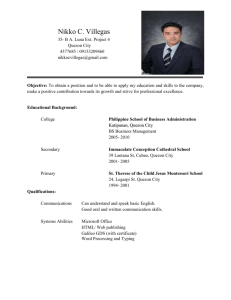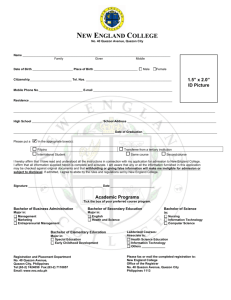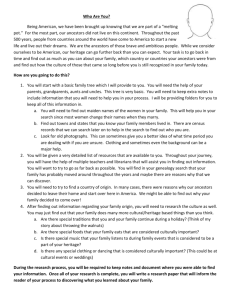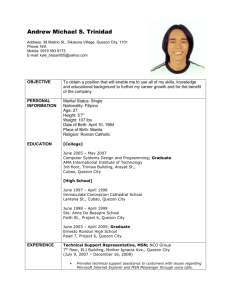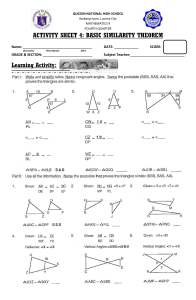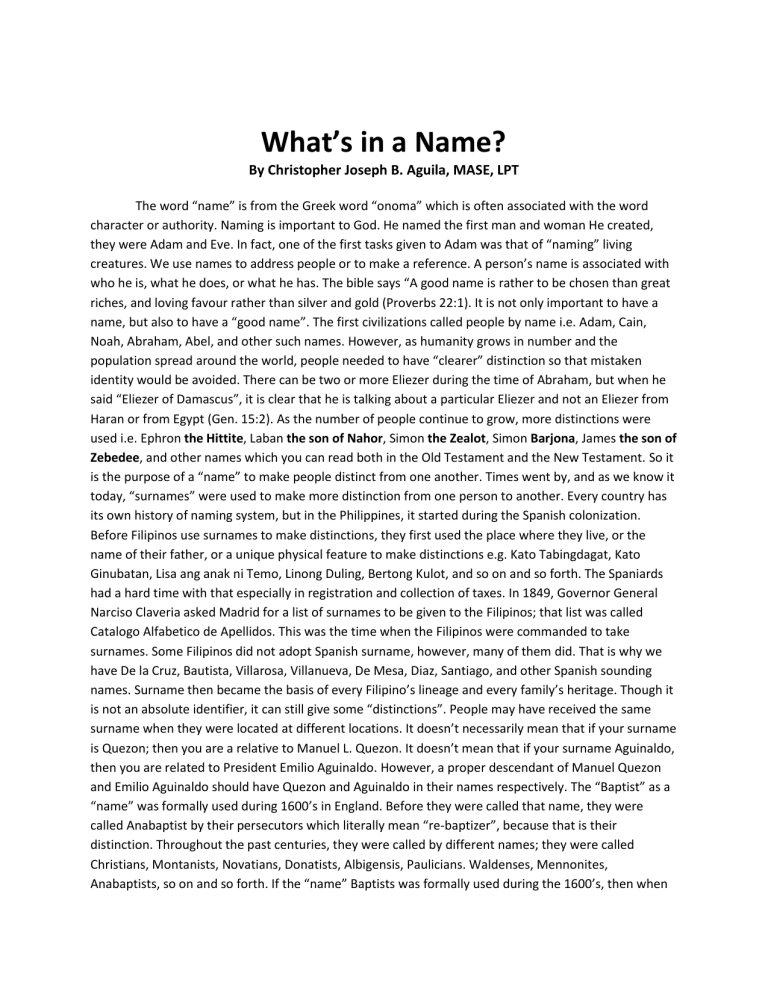
What’s in a Name? By Christopher Joseph B. Aguila, MASE, LPT The word “name” is from the Greek word “onoma” which is often associated with the word character or authority. Naming is important to God. He named the first man and woman He created, they were Adam and Eve. In fact, one of the first tasks given to Adam was that of “naming” living creatures. We use names to address people or to make a reference. A person’s name is associated with who he is, what he does, or what he has. The bible says “A good name is rather to be chosen than great riches, and loving favour rather than silver and gold (Proverbs 22:1). It is not only important to have a name, but also to have a “good name”. The first civilizations called people by name i.e. Adam, Cain, Noah, Abraham, Abel, and other such names. However, as humanity grows in number and the population spread around the world, people needed to have “clearer” distinction so that mistaken identity would be avoided. There can be two or more Eliezer during the time of Abraham, but when he said “Eliezer of Damascus”, it is clear that he is talking about a particular Eliezer and not an Eliezer from Haran or from Egypt (Gen. 15:2). As the number of people continue to grow, more distinctions were used i.e. Ephron the Hittite, Laban the son of Nahor, Simon the Zealot, Simon Barjona, James the son of Zebedee, and other names which you can read both in the Old Testament and the New Testament. So it is the purpose of a “name” to make people distinct from one another. Times went by, and as we know it today, “surnames” were used to make more distinction from one person to another. Every country has its own history of naming system, but in the Philippines, it started during the Spanish colonization. Before Filipinos use surnames to make distinctions, they first used the place where they live, or the name of their father, or a unique physical feature to make distinctions e.g. Kato Tabingdagat, Kato Ginubatan, Lisa ang anak ni Temo, Linong Duling, Bertong Kulot, and so on and so forth. The Spaniards had a hard time with that especially in registration and collection of taxes. In 1849, Governor General Narciso Claveria asked Madrid for a list of surnames to be given to the Filipinos; that list was called Catalogo Alfabetico de Apellidos. This was the time when the Filipinos were commanded to take surnames. Some Filipinos did not adopt Spanish surname, however, many of them did. That is why we have De la Cruz, Bautista, Villarosa, Villanueva, De Mesa, Diaz, Santiago, and other Spanish sounding names. Surname then became the basis of every Filipino’s lineage and every family’s heritage. Though it is not an absolute identifier, it can still give some “distinctions”. People may have received the same surname when they were located at different locations. It doesn’t necessarily mean that if your surname is Quezon; then you are a relative to Manuel L. Quezon. It doesn’t mean that if your surname Aguinaldo, then you are related to President Emilio Aguinaldo. However, a proper descendant of Manuel Quezon and Emilio Aguinaldo should have Quezon and Aguinaldo in their names respectively. The “Baptist” as a “name” was formally used during 1600’s in England. Before they were called that name, they were called Anabaptist by their persecutors which literally mean “re-baptizer”, because that is their distinction. Throughout the past centuries, they were called by different names; they were called Christians, Montanists, Novatians, Donatists, Albigensis, Paulicians. Waldenses, Mennonites, Anabaptists, so on and so forth. If the “name” Baptists was formally used during the 1600’s, then when did the Baptist as a church really began? Some liberal historians say that Baptist only began during 1600’s in England. If that is the case, it is like saying that Quezon’s and Aginaldo’s ancestors only existed in 1849. Were Quezon’s ancestors living before 1849? Had Aguinaldo’s ancestors existed before 1849? They should not live if their ancestors did not. It is like saying their ancestors just exist from nowhere in 1849. No one can ever trace his lineage and name his ancestors back during the pre-historic Philippines, or during the time of Magellan, or during 300 BC, but FOR SURE we have our ancestors back then. Guess what? They were called by different names, not yet Marquez, Tarranco, Unada or Malacapay. Baptist is the name which the Montanists, the Donatists, the Paulicians are called starting 1600’s. They are now called “the Baptists”. The descendants of Quezon and Aguinaldo are somehow privileged because they have some heritage passed on to them by their forefathers. However, we can only trace the richness of their heritage way back Spanish Era. We can only pinpoint “some” important key persons in their lineage. But as a Baptist, our heritage can be traced through the unbroken chain of faithful martyrs and contenders back to the first church in Jerusalem. We are not descendants of Quezon nor of Aguinaldo but we are descendants of Christ, Paul of Tarsus, Timothy, Polycarp, Montanus, Peter Waldo, William Carey, Charles Spurgeon and many other notable as well as unnamed missionary Christians and Martyrs who died contending for the “faith” given to us by God. We inherited a rich heritage, the bible, doctrine, beliefs, principles, practices, Baptist baptism, coated by the blood of the soldiers of Christ throughout the ages. However, Satan’s warfare of counterfeits hurts our “name”. Is the Baptist name still important when many churches bearing that name have drifted far from the “old paths” where our forefathers had walked? Is the Baptist name still important when many churches bearing that name have resto bars, rock concerts, homosexuality, and such heresies and apostasies in their churches? If there are 10, 000 criminals whose surnames are Quezon and Aguinaldo, should the descendants of Manuel Quezon and Emilio Aguinaldo change their surname? There are lots of Quezons and Aguinaldos throughout the archipelago, but for sure there is only one clan they left which received their legacy and heritage. There is a lineage of churches which the heritage of the Lord’s Church is passed from a generation to the other. The doctrine, the beliefs, the principles and the practices was passed to the New Testament, Bible believing, KJV only, local, real conservative, Baptist churches. No matter how Satan destroys our “name”, it is still our heritage, our distinction. And the last time we checked, the Lord’s people and the Lord’s churches are called Baptists TODAY.
